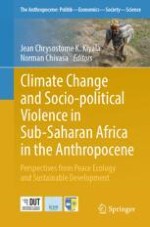2024 | OriginalPaper | Buchkapitel
24. Schools as Agents of Change: Impacts of Restorative Circles at Mbambangwe School in KwaZulu-Natal, South Africa
verfasst von : Sibusisiwe Mlambo, Jean Chrysostome K. Kiyala
Erschienen in: Climate Change and Socio-political Violence in Sub-Saharan Africa in the Anthropocene
Verlag: Springer Nature Switzerland
Aktivieren Sie unsere intelligente Suche, um passende Fachinhalte oder Patente zu finden.
Wählen Sie Textabschnitte aus um mit Künstlicher Intelligenz passenden Patente zu finden. powered by
Markieren Sie Textabschnitte, um KI-gestützt weitere passende Inhalte zu finden. powered by
